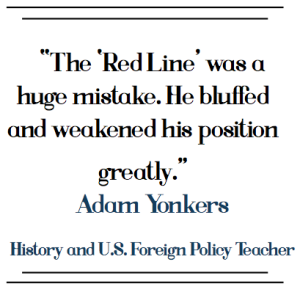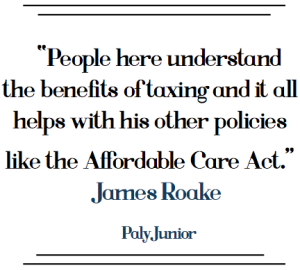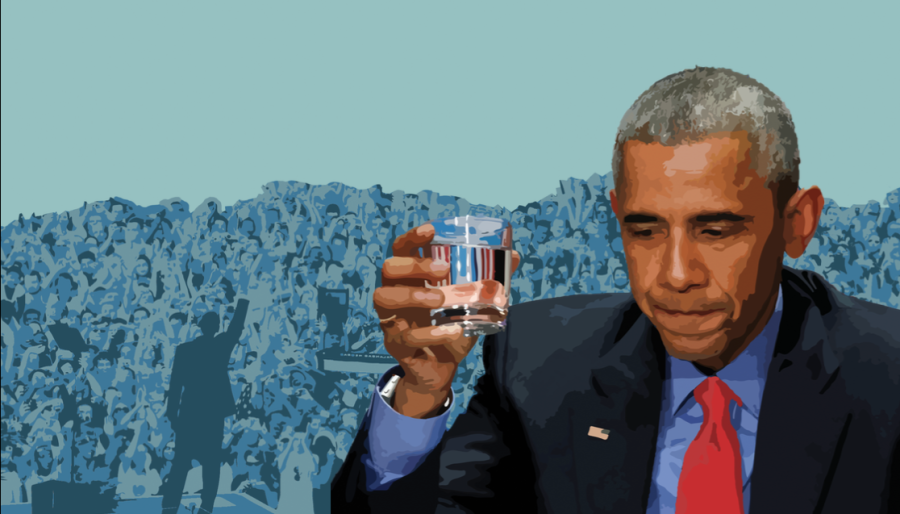For 228 years, our nation has seen many men take on what is arguably, the most difficult job in America: the presidency. While executives have had varied impacts on America, the 44th President of the United States will leave office indubitably having changed the game.
Barack Obama’s eight years in the Oval Office aided the progress of the country in the eyes of many of his constituents, as popularity ratings show. His legacy will leave a lasting impact on Americans for generations to come in a variety of areas, ranging from healthcare to the withdrawal of American troops from Afghan soil. Yet Obama’s journey and the actions that his administration took along the way did not satisfy all of America. In this article, The Campanile explores the nuances of Mr. Obama’s contributions to the United States, and the consequences of his actions for our readers and the nation itself.
[divider]Foreign Policy[/divider]
It might be best summed up that Obama was more of a singles hitter than a home run slugger when it came to foreign policy. He charged into office with unimaginable optimism and heightened expectations, both of which soon deflated. When dealing with foreign nations, Obama seemed to favor intervention but not to its fullest extent. The President appeared to take a lighter approach: Instead of deploying troops on foreign land, he would use sanctions or threats, which many have criticized as “soft.” Despite this departure from America’s previous gung-ho intervention, his methods have proved successful.
The agreement that America and Iran settled upon is an admirable one. Obama had underscored that the negotiations were about Iran’s nuclear program and its dismantling. To achieve this negotiation, sanctions were placed upon Iran which prevented the flow of roughly $100 billion in Iranian assets. Iran subsequently, agreed to get rid of a large majority of its nuclear program due to the sanctions. The agreement showed the U.S.’s exemplary capability to broker a settlement without the use of violence.
One of his most highly criticized decisions was his “Red Line Policy.” Obama made a statement claiming that any of use of chemical weaponry used by Syrian President Bashar al-Assad would be crossing a “red line” which would result in a strike. Despite this threat, Assad proceeded to also kill approximately 1,400 people with Sarin gas. Yet, the president did not take action with a strike against Syria when the message was clear: Assad needed not violate the international norms that prohibit the use of chemical weapons. This decision greatly put US credibility at risk, and made the country seem less powerful in foreign eyes.
In another instance, the U.S. once again opted for softer forms of intervention when dealing with the 2014 Russian military intervention in the Ukraine. As a result, many countries (primarily the U.S) placed sanctions on businesses, individuals and officials of Russia. The sanctions contributed to the currently ongoing Russian financial crisis. Ukrainian officials later stated that Russia was forced to change its approach towards Ukraine due to the sanctions.
“For a while now we’ve been trying to get my grandmother a green card,” said senior, Bianca Alshamary. “We’ve noticed that depending on U.S. and Russian relations, its been more difficult to get a Visa.”
While many may denounce that Obama’s tactics as “soft” they have generally proved effective.
I would say that [Obama] wanted to make more of an effort to repair some of the ways people thought of the U.S. under Bush,” Yonkers said. “He was very willing to negotiate and compromise.”
[divider]Economic Policy[/divider]
The economic reforms under Obama’s presidency heavily favored pouring money into the country as a whole. Fiscally the Obama administration focused on expanding the role of the government, addressing the federal budget deficit, raising the income tax and lowering unemployment.
Obama entered the presidency at a time when the economy was in distress, and among his first actions were to try and improve the situation of the country after the recession. The American Recovery and Reinvestment Act was the response to the recession that focused on creating new jobs, investing in infrastructure, education, health and energy. The estimated cost of this stimulus package was $787 billion at the time of its passage, but that cost is expected to rise to a staggering $831 billion between 2009 and 2019.
The impact of the stimulus agreement has been largely controversial as the effect of the agreement is a topic of disagreement. The studies that have been conducted regarding its effectiveness have produced a wide variety of results. However, a study conducted by the University of Chicago concluded that 80 percent of economists believe that the unemployment rate in the United States was lower by the end of 2010 than it would have been without the stimulus. Despite this fact, the opinions of whether the improvements outweigh the costs of the stimulus are much more varied. 46 percent of economists “agreed” or “strongly agreed” with the stimulus as a whole, 27 percent were “uncertain,” and 12 percent “disagreed” or “strongly disagreed.” However, this data changed when economists were asked again about their opinions in 2014 when 56 percent “agreed” or “strongly agreed,” 23 percent were “uncertain,” and only 5 percent “disagreed.”
stimulus agreement has been largely controversial as the effect of the agreement is a topic of disagreement. The studies that have been conducted regarding its effectiveness have produced a wide variety of results. However, a study conducted by the University of Chicago concluded that 80 percent of economists believe that the unemployment rate in the United States was lower by the end of 2010 than it would have been without the stimulus. Despite this fact, the opinions of whether the improvements outweigh the costs of the stimulus are much more varied. 46 percent of economists “agreed” or “strongly agreed” with the stimulus as a whole, 27 percent were “uncertain,” and 12 percent “disagreed” or “strongly disagreed.” However, this data changed when economists were asked again about their opinions in 2014 when 56 percent “agreed” or “strongly agreed,” 23 percent were “uncertain,” and only 5 percent “disagreed.”
Throughout his presidency, Obama made several reforms which primarily involved levying taxes on the wealthy. The top 1 percent of earners in the U.S. are now paying an average tax rate that is 6 percentage points higher than when Obama first took office. The increased taxes were aimed at helping middle and low income families at a hefty cost to millionaires. The so-called “Buffett Rule” which was proposed by Obama but denied before implementation would have imposed a minimum 30 percent effective federal tax rate on the wealthy. Despite many of Obama’s tax reforms not being imposed, the legislation still helped the overall push of tax increases.
“I don’t think it impacts people too much around here besides taxing them more,” said junior James Roake. “People here unde
rstand the benefits of taxing and it all helps with his other policies like the Affordable Care Act.”
The presidency had a large affect on many living in Palo Alto as it is generally regarded as a high-income area. The tax reforms therefore were targeted at areas like Palo Alto, and increased taxes for many in the area.
“Considering that Palo Alto is in one of the highest tax brackets, I understand that by raising the taxes our parents are dealing with having to pay even higher taxes,” said junior Johnny Loftus. “In the long term this could affect the possibility for some [local] parents being able to put multiple children through college.”
[divider]Social Policy[/divider]
Obama has time after time been praised for his fight for social equality, especially in the arenas of race and gender. Throughout his presidency, Obama appealed to the people directly and championed legal action for social change.
The last eight years have seen an enormous increase in LGBTQ movements. Obama worked tirelessly on eliminating discrimination and hate crimes towards LGBTQ Americans, such as when he worked together with Congress to pass the Matthew Shepard and James Byrd Hate Crimes Prevention Act. The law protected people from being bullied or harassed based upon their sexual orientation and was a landmark achievement for the safety and protection of the LGBTQ community.
“I think [Obama] has made a tremendous effort in instigating the conversation around LGBTQ rights,“ said senior Ibby Day. “I am immensely pleased that it is now a constitutional law that same-sex marriage is legal.”
Obama also worked with legislators to repeal “Don’t Ask, Don’t Tell.” This allowed for gay, lesbian and bisexual Americans to serve in the armed forces without the fear of being dismissed because of their sexual orientation.
In 2015, the Supreme Court decided to hear a case involving same-sex marriage, Obergefell v. Hodges. The court’s ruling stated same sex couples would have constitutional rights to marry and have their marriages recognized.
The legal actions taken by Obama have been his attempt to lead by example. He stated that protecting LGBT rights worldwide is still a long time goal. Although this goal may require a lot more time and effort, Obama has taken the U.S. a big step forward.
“Advancing this goal has long been a cornerstone of American diplomacy, and I am proud that my administration has made advancing the human rights of LGBT individuals a specific focus of our engagement around the world,” stated Obama in an interview with The Atlantic.
In the vein of Civil Rights, significant action has also been taken towards battling sexual assault on college campuses. Obama and Vice President Joe Biden have launched a campaign called “It’s On Us” with the intent to put an end to sexual assault at colleges and bring awareness to the issue.
“An estimated one in five women has been sexually assaulted during her college years — one in five,” said Obama “Of those assaults, only 12 percent are reported, and of those reported assaults, only a fraction of the offenders are punished.”
The effort has helped combat sexual assault by sending aid for every federally funded college. Many laws have been reviewed to make sure that students are adequately protected.
“It is on all of us to reject the quiet tolerance of sexual assault and to refuse to accept what’s unacceptable,” stated Obama.
[divider]Partisan Policy[/divider]
Perhaps the most controversial portions of Obama’s presidency involved his partisanship. Obama was in charge during the government shutdown in 2013 and later, in 2016, was over a conflict with the Republican-controlled Congress in the nomination of a new Supreme Court Justice.
The United States government entered a shutdown from October 1-16, 2013. This resulted in the curtailing of most routine operations because neither new legislation nor a continuing resolution for the fiscal year of 2014 was put in place in time. The government shutdown impacted a large part of the population, as roughly 800,000 federal employees were furloughed, and 1.3 million other people were left not knowing when they would receive their next paycheck.
The budget breakdown was largely a result of the battle between Obama and the GOP. The two parties made several accusations and Obama made additional anti-GOP speeches, further damaging the relationship between the two parties. They refused to compromise on the issues.
The shutdown had major effects on many parts of America. Many departments and employees were furloughed, as national parks, the National Zoo and NASA were all closed. The Veterans Affairs secretary warned that they would be unable to send out compensation checks to 5.1 million veterans if the shutdown continued.
The governmental shutdown was one of the lowlights of Obama’s presidency as it cost the country an estimated total of $24 billion in lost economic output, and it could have been prevented with a compromise.
Obama’s actions were also controversial when the Republican-controlled Senate refused to accept the nomination to the Supreme Court of Merrick Garland, a conservative justice. They not only blocked the appointment of Garland but also vowed to dismiss any other nominations made by President Obama.
The actions of the Senate were unprecedented as a presidential right like appointing a Supreme Court justice had never been denied in full whilst the president was still in office. The refusal also broke a 100-year long record for the longest time between the nomination and confirmation of a U.S. Supreme Court nominee. The Supreme Court nomination is now up to the new president, and considering that government is now largely Republican controlled, the nomination process will involve much different candidates which could alter court decisions in future cases.
From the perspective of a Palo Alto High School teacher, the time Obama spent in office could have been much more effective had it not been for constant gridlock. He showed promise in his first few years of office when he had the backing of a Democrat-controlled Congress.
“I think on a very simple level, if the two parties are deadlocked and are unable to compromise, and choose not to compromise to work together to create policy, then nothing is going to happen,” said U.S. History, and Economics teacher Grant Blackburn. “I think it was the problem of Congress. Obama didn’t create that separation. For example, in Obama’s first years, he had a democratic Congress, and got a lot done. Eventually the Democrats got voted out and as a result you saw that deadlock occur. I thought that it was going to be a huge mistake by the Republicans, but it ended out turning out for them.”
However, the gridlock did definitely hinder the effectiveness of the government as a whole. This ineffectiveness at times might be the reason a large portion of the population wanted a shift in power come the 2016 election.
“It certainly wasn’t helpful in passing laws,” Roake said, “I think that certain Americans were tired of denial so I think that led to a Republican President eventually taking over. They wanted more change to happen.”
Regarding his partisan policy, Obama’s presidency could be viewed in the future as a gridlock between Republicans and Democrats. The refusal to compromise between both parties halted the process of reform, and will likely be seen as a low point of the last eight years. In Unites States history, presidents of the past have been able to successfully compromise with the other which led to great reform.
[divider]Lasting Impact[/divider]
Overall, Obama’s eight years in the Oval Office proved predictably substantial to the progression of the country. His legacy will leave a long-lasting impact on Americans for generations to come. While he impacted the political world, he also set an example as a family man and a good-hearted individual. His poise and elegance are characteristics which are hard to come by in today’s political environment. While many of the issues he faced still need fighting for, he broke the barriers previously set and was able to point the country in the right direction.

